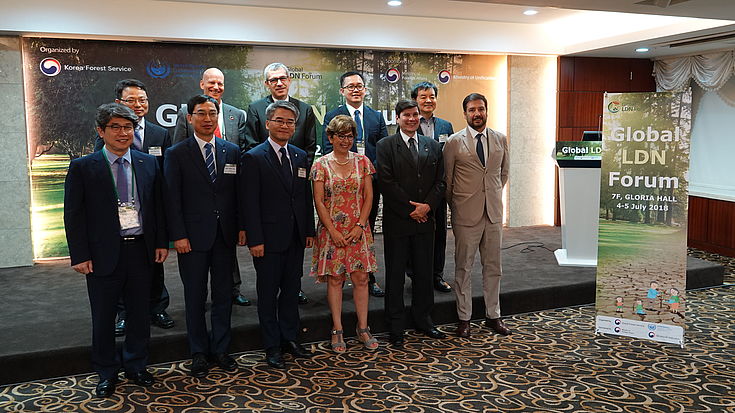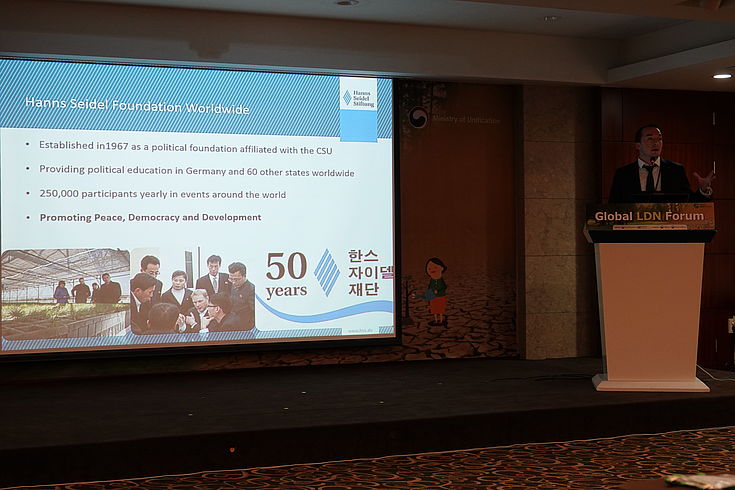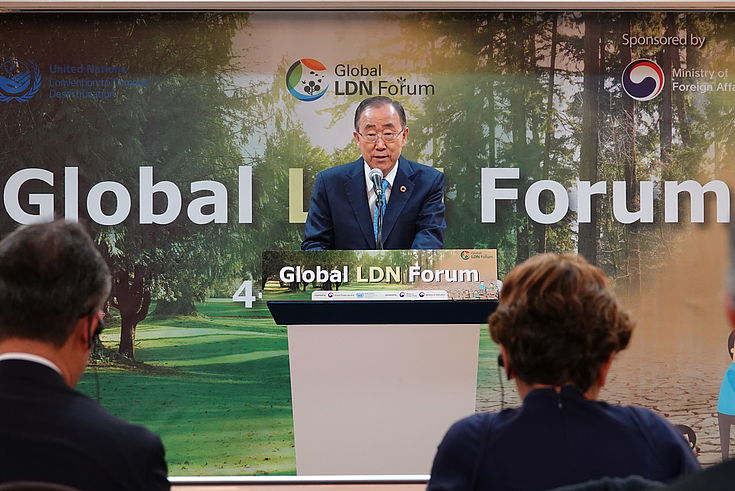Sustainable Development
Land Degradation as a Global Problem
The participants of the First Global Land Degradation Neutrality Forum
HSF
Land Degradation as a Global Problem
The goal of land degradation neutrality is maintaining or enhancing the land resource base, i.e. no net loss of healthy and productive land in order to ensure human well-being, food security, and sustainable ecosystems. Land degradation has received much less attention than climate change or biodiversity but is directly linked to both and should thus be addressed through transboundary cooperation.
Mr Barron Orr from the UNCCD opened the forum and moderated it with his colleague Sasha Alexander. The participants of the forum came from various countries and continents which underlined the global dimension of land degradation. Mr Alagie Mangie from Gambia, for instance, talked about the vision of a “Great Green Wall” to combat desertification in the Sahel, while Dario Mandelburger reported on the cooperation between Paraguay, Brazil and Bolivia to save the Pantanal Wetlands. Experts from Bosnia and Herzegovina as well as Georgia emphasised that regional cooperation is indispensable for small countries to achieve significant improvements, but also offers a chance to foster peace and security through building trust.
Felix Glenk sharing the Hanns Seidel Foundation's experience of combating land degradation in DPRK
HSF
Hanns Seidel Foundation Sharing its Experience of Environmental Cooperation with DPR Korea
Felix Glenk, project manager for DPR Korea at the Hanns Seidel Foundation Korea, shared his experience of environmental cooperation projects in North Korea which has been severely affected by land degradation: In the past twenty-five years it has lost forty percent of its forests because of North Korea’s reliance on wood for energy supply and need for arable land to compensate for international sanctions. To tackle deforestation, the HSF established a training center for sustainable forestry including an afforestation site of 100 hectares and study trips to China and Mongolia. This EU-funded project focused on capacity building and institutional strengthening. Likewise, the HSF has been working with local authorities to help conserve wetlands and use them sustainably since they represent a crucial stopover for migratory birds on the East Asian-Australasian flyway. Through such projects the Hanns Seidel Foundation has been able to bring North and South Koreans together, so that environmental cooperation can serve as a starting point to decrease tensions in the long-run.
Ban Ki-Moon speaking about global green growth
HSF
Ban Ki-Moon Calling for International Cooperation to achieve Land Degradation Neutrality
The second day of the forum started with a speech of the President and Chairman of the Global Green Growth Institute and former General Secretary of the United Nations, Ban Ki-Moon. He stressed that land degradation neutrality was close to his heart and gave a remarkable speech, urging the international community to break the vicious circle of the ongoing loss of healthy land through international cooperation. Referring to the recent détente on the Korean Peninsula, he argued that it would be wise to explore potential environmental cooperation, a notion which the Hanns Seidel Foundation very much supports. The last part of the forum was a field trip to the De-Militarized Zone (DMZ) and the Unification Observatory from which one had an impressive view right into North Korea. Thanks to little human interference the DMZ has become an area of great biodiversity and might follow the example of the German “Green Belt” in case hostilities cease one day.



